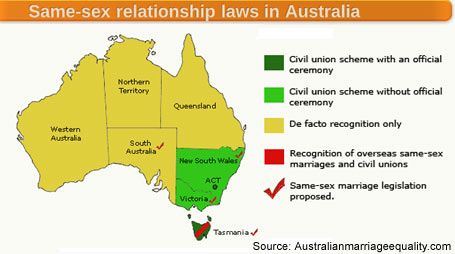Until the ban was lifted on Dec 4, the Australian Government is known to have a policy of not issuing the certificates to an Australian citizen who is seeking to marry a same-sex partner in a country that allows same-sex marriage.
Attorney-General Robert McClelland announced the policy change at the ruling Labor party’s National Conference.
The certificates, known as Certificates of Non-Impediment to Marriage or CNIs, serve to confirm to a foreign government that the Australian who wants to marry under its laws is not already married in Australia. Up to now, the certificates are issued routinely to Australians intending to enter opposite-sex marriages overseas.
An overseas same-sex wedding will not be recognised as forming a marriage when the couple returns to Australia, but it will be used as evidence of a relationship for regional laws.
According to Australian Marriage Equality (AME), the policy has been in place since 2004.
AME spokesman Rodney Croome said the change will make a real difference those wanting to marry overseas.
"Many gay and lesbians Australians travel overseas to marry because they can't marry here, but when they discover the Australian government won't give them the required paperwork, weddings plans have to be cancelled," Croome said.
The new policy comes a day after the Labor Party National Conference adopted a new party policy supporting marriage equality – a reversal of its longstanding position on the issue – but allowing Labor MPs a conscience vote on the issue next year.
In November, openly lesbian Finance Minister Penny Wong was quoted as saying in the local media that she rejects the conscience vote as the means of resolving the party's internal debate. "Equality should not be a matter of conscience; it should be reflected in Labor policy," Wong said in a plea for her party to endorse same-sex marriage.
Update (Dec 13, 2011): On December 1, Queensland lawmakers passed the Civil Partnerships Bill which will allow same-sex and opposite-sex couples in Queensland to enter into legally recognised civil unions. The legislation now aligns Queensland with reforms already made in Tasmania, Victoria, New South Wales and the Australian Capital Territory.

